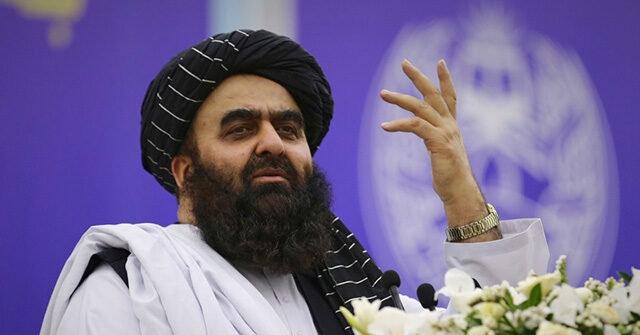Taliban officials urged Japan to consider recognizing the jihadist terrorist organization as the legitimate government of Afghanistan this week as they marked the fourth anniversary of seizing power.
The Taliban has been in control of Afghanistan since August 15, 2021, when then-Afghan President Ashraf Ghani abruptly fled after Taliban terrorists reached the city limits of the capital, Kabul. The Afghan armed forces collapsed in months following a decision by then-President Joe Biden to violate an agreement that would have seen American troops withdraw from Afghanistan in May 2021, prolonging the already 20-year-old war. This violation prompted the Taliban to unleash a national wave of violence featuring tens of thousands of attacks on the government that ultimately led to their return to power.
While maintaining uncontested control of the Afghan state for four years, only one country on the planet, Russia, has recognized the Taliban as the legitimate government of Afghanistan. Taliban jihadists have welcomed a Russian ambassador to Kabul and have in turn sent an official ambassador to Moscow, as well as pursued economic partnerships with Russian companies. In addition to Russia, the Taliban maintains friendly, though informal, ties with China and Iran, but neither neighbor has fully embraced the Taliban as a long-term tyranny at press time.
The United Nations does not recognize the Taliban as the government of Afghanistan and does not provide it recognition at the venue, expected to host its annual General Assembly high-level debate for heads of state next month.
Din Mohammad Hanif, the Taliban’s “economy minister,” sat down for an interview with Japan’s NHK network on Saturday to encourage Tokyo to join the small list of countries embracing his jihadist leadership.
“He expressed hope that Russia would extend economic cooperation with investment and development of the country’s mineral resources,” NHK detailed, translating the Taliban official’s comments. “Hanif said they will also request other countries including Japan to recognize their government. He said they expect that Japanese companies will invest in Afghanistan, as the security situation is good.”
The Japanese government, a close ally of the United States that has been technically at war with Russia for over 70 years and maintains acrimonious relations with China and Iran, has not made any effort to befriend the Taliban. Japanese officials have expressed concern about the dire human rights situation in Afghanistan, however, both the dire poverty suffered by most Afghan citizens and the rampant abuses by Taliban officials against civilians, particularly women.
Hanif, the Taliban economy minister, claimed that reports of human rights abuses against women in the country were false, according to NHK, but demanded that “the country’s religious customs should be respected,” referring to the Taliban’s violent extremist imposition of sharia, or Islamic law.
Japan maintained the presence of an envoy in Kabul, Ambassador Takayoshi Kuromaya, through August 14, the day before the anniversary of the Taliban takeover. The Taliban sent him off warmly, according to the Afghan outlet Tolo News, expressing appreciation for his presence in the country. Kuromaya engaged with the Taliban “foreign ministry” shortly before his departure in a meeting that the ministry described as appreciative. A Taliban deputy foreign minister, Mohammad Naeem, “referred to the historic value of relations between the two countries and stressed the expansion of economic, security, and cultural cooperation,” the jihadists said in a statement.
Naeem “also provided information on Afghanistan’s stability, prevention of narcotics cultivation and trafficking, eradication of corruption, and implementation of infrastructure projects, and called for a positive understanding from the international community.”
An Afghan “political affairs analyst” told Tolo News that, from the perspective of the Taliban, Japan maintaining a diplomatic presence in Afghanistan was “essential.” Japan expanding relations with the country could result in significant foreign investment, which Afghanistan desperately needs.
The Taliban has been campaigning for recognition from Japan for months. In February, it sent its first official delegation to Tokyo, reportedly demanding “humanitarian support.”

“We seek dignified interaction with the world for a strong, united, advanced, prosperous, developed Afghanistan and to be an active member of the international community,” Taliban economic official Latif Nazari said at the time. The engagement did not result in any meaningful changes in the relationship between the Taliban and Japan.
In remarks a month later, Nazari explicitly stated that the Taliban was hoping to attract Japanese investment in “infrastructure and industry development.” In an apparent concession that Tokyo was largely concerned about the jihadists’ record of human rights atrocities, Nazari also denied the extensive evidence of widespread abuse of women and girls.
“Women are working in places such as the Ministry of Education, airport, and even the police,” he claimed.
“The interim regime is hoping for a stronger relationship with Japan,” he continued.
In reality the Taliban remains a repressive Islamist force, particularly brutal towards women and girls. A United Nations report published this month found the group “closer than ever to achieving its vision of a society that completely erases women from public life” and referred to the situation in Afghanistan as “the most severe women’s rights crisis in the world.”
“Girls are banned from school after the age of about 13,” the U.N. narrated. “Women are barred from most jobs, from political life and, in many parts of the country, can’t walk on the streets unaccompanied by men. Most women can’t even make decisions within their own households.”
A separate report published last week by the U.S. office of the Special Investigator General for Afghanistan Reconstruction (SIGAR) also accused the Taliban of systemic corruption in its relations with foreign humanitarian aid groups. SIGAR found evidence that the Taliban regularly misappropriated funds for humanitarian efforts, blocked aid from reaching minority communities, and stole money by forcing humanitarian groups to hire ghost Taliban workers before accessing the country.
“In some cases, the Taliban require an NGO to put a person on their payroll to collect a salary without ever showing up to work,” the SIGAR report noted.
Follow Frances Martel on Facebook and Twitter.
Read the full article here


